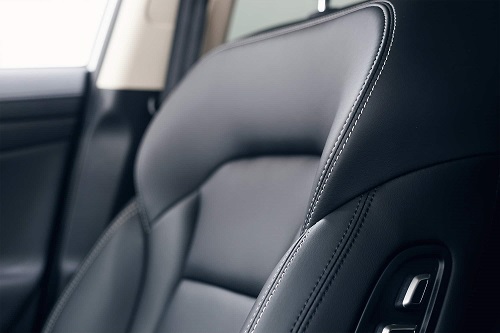6 December 2021
Car maker Volvo created quite a storm online with its announcement that in future it will not offer any genuine leather at all in its cars. As reported in Automotive News, the decision sets Volvo apart from other manufacturers who continue to offer their customers a choice. Report by One 4 Leather.

According to the article, Volvo claims to be responding to customer expectations but there is a lot about the story that doesn’t quite stack up. Robin Page, head of design for Volvo cars, is quoted as saying: “People are much more aware of climate change and the effects on the planet” and that they “want to know more about the materials and where they are sourced from and where they come from”. But these are not reasons to cancel leather. He quotes the figure of “around 14 percent of global greenhouse gas emissions from human activity, with the majority coming from cattle farming”, but eschewing automotive leather will not prevent a single cow being reared or slaughtered, because demand for meat continues to rise. Leather is simply a by-product of the meat industry. If the hide is not used it will end up in landfill or be incinerated, and plastics will be used instead – causing precisely the emissions the car company claims it wants to stop.
Page is also quoted as saying: “Our ultimate aim is to get recycled natural materials, because that is the full sustainability part”. And yet leather is the ultimate “recycled natural material” coming from nature and capable of biodegrading back into nature at the end of its useful life. Leather commentator Michael Redwood memorably reiterates this point in his article ‘Creatures of Emotion’, saying: “What… could be more compatible [with Volvo’s ethics] than long-lasting leather, made entirely from renewable hides available as a by-product of northern European grass-fed livestock, who are almost totally part of either regenerative or carbon neutral systems? Ethically and logically, I struggle to imagine a better material for Volvo.”
Volvo seems to be turning its back on precisely the sustainable material it says it wants to promote. Or, as La Conceria puts it: “Why ban a circular material that is recovered, when the goal is being circular?”. Even more bizarrely, it is replacing it with artificial materials derived from fossil fuels. It is currently using a material called ‘Nordico’ made from recycled PET bottles despite the fact that the plastic from those bottles does not biodegrade and has been shown to have a very detrimental effect on wildlife and, particularly, sea-life. Similarly, it uses ‘Microtech’, a suede-like material made from polyester – another plastic.
Perhaps, to be fair, Volvo is simply responding to commercial pressures and market trends. Page claims that “customers expectations are changing. They want to know more about the materials and where they are sourced from.” But improvements in transparency and leather traceability at modern tanneries mean that it is quite possible to find out where leather has been sourced from. It could even become an actual selling point to say “we use ethically-sourced 100% natural leather” and make it an intrinsic part of a sustainability story. Kerry Senior, Director at Leather UK, points out the ultimate irony in this move away from leather for spurious sustainability reasons: “Volvo claims it is ‘aiming for 25% of the material in new Volvo cars to consist of recycled and bio-base content’. Leather is recycled and bio-based, much more so than the PET that will be used instead.”
The biggest problem is that consumers are being misled and constantly fed a cocktail of misinformation about car interior leather. So-called ‘vegan’ options invariably include plastics in some form or other – either as a base material or protective layer. But people conflate ‘vegan’ with ‘sustainable’ when they are two completely different things. Veganism is an ethical decision not to use anything derived from animals, which is a perfectly reasonable and laudable position to take. But this is nothing to do with sustainability, because the alternatives to leather are very often highly harmful to the environment or, at the very least, far less sustainable than is claimed. Once this truth becomes more widely known it is quite conceivable that a new ‘anti-plastics’ movement will emerge and present a whole new ‘market trend’ for manufacturers like Volvo to respond to.
我们为皮革、物料及时装业界创造面对面洽谈的机会,为客户缔造实质商机。我们云集世界各地的商家,让他们寻找新的合作伙伴,发掘潜在客户或供应商,并掌握业界最新发展。
我们主办多个专注时尚及生活潮流的商贸展览会, 为这不断变化的行业,提供最全面的买家及参展商服务,方便他们了解急速转变的行业环境,并预测来季趋势。

使用条款 | 隐私政策 | APLF 可持续发展